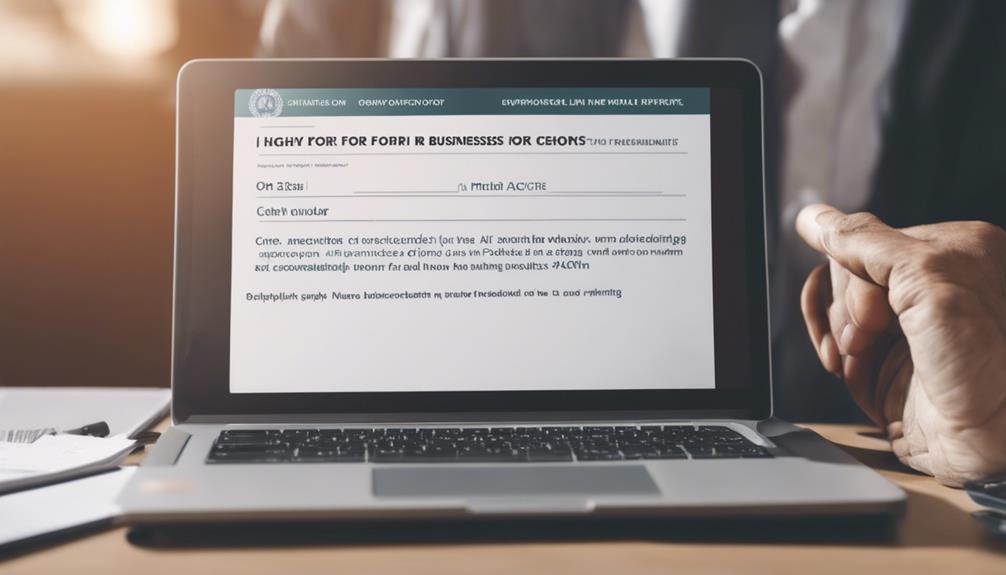Embarking on the journey of setting up a business as a non-resident is akin to navigating uncharted waters. The complexities and nuances can be daunting, yet crucial for your success. By meticulously following the prescribed business setup steps, you lay a solid foundation that not only ensures compliance but also paves the way for growth and sustainability in a foreign land.
But why is this meticulousness so essential? The answer lies in the intricate interplay of legal, financial, and operational aspects that can make or break your entrepreneurial endeavors in a new territory.
Key Takeaways
- Ensures legal compliance in foreign markets.
- Facilitates financial transparency and tax efficiency.
- Builds credibility with stakeholders and clients.
- Provides professional support for operational success.
Legal Requirements Overview
Curious about the legal requirements for setting up a business as a non-resident? Understanding legal obligations and navigating regulations is crucial for a successful venture. As a non-resident looking to establish a business, it’s essential to comply with the laws of the country where you plan to operate. Each nation has its unique set of rules and regulations governing business setups, and being aware of these can save you from potential legal troubles down the road.
To navigate the regulatory landscape effectively, consider seeking professional advice from local experts or legal advisors specializing in business laws for non-residents. They can guide you through the process, ensuring that you meet all the necessary legal requirements. Additionally, familiarize yourself with the specific permits, licenses, and registrations needed to operate legally in your chosen market.
Choose Business Structure
To establish a solid foundation for your business as a non-resident, selecting the appropriate business structure is a critical decision that will shape how your venture operates within the legal framework of your chosen market. When choosing your business structure, consider the following:
- Business Registration: Ensure that you comply with all the necessary business registration requirements in your chosen market. This step is crucial to establish your business as a legal entity and gain credibility in the eyes of your customers and partners.
- Entity Selection: Decide on the type of entity that best suits your business needs, whether it’s a sole proprietorship, partnership, corporation, or limited liability company (LLC). Each entity type has different implications for liability, taxes, and operational flexibility.
- Legal Compliance: Understand the legal implications of the business structure you choose. Make sure you’re aware of the tax obligations, reporting requirements, and other legal responsibilities associated with your selected entity.
Obtain EIN From IRS

When setting up your business as a non-resident, obtaining an EIN from the IRS is crucial.
The EIN application process, the importance of having an EIN, and the specific requirements set by the IRS are key points to consider.
Let’s explore these aspects to ensure your business is legally compliant and ready for operation.
EIN Application Process
To efficiently establish your business, applying for an EIN from the IRS is a crucial step in the process. Here are three key points to consider during the EIN application process:
- Resources Needed:
- Ensure you have all necessary documentation ready, such as your SSN or ITIN, legal name, and business structure details to streamline the application process.
- Common Mistakes:
- Avoid errors like using incorrect information, applying for an EIN when not required, or submitting multiple applications, as this can lead to delays or rejections.
- Timely Submission:
- Submit your EIN application promptly to prevent any delays in starting your business operations and ensure compliance with legal requirements.
Importance of EIN
Understanding the significance of obtaining an EIN from the IRS is pivotal for any non-resident looking to establish a business in the United States. By acquiring an Employer Identification Number (EIN), you open doors to numerous benefits that are crucial for your business’s growth and compliance. Here’s why obtaining an EIN is vital:
| Importance of EIN | |
|---|---|
| Tax Implications | |
| Business Identification | |
An EIN is not just a random number; it plays a vital role in your business’s tax implications and provides a solid foundation for your business identification. Without this essential identifier, navigating the U.S. business landscape can be challenging. Take the first step towards establishing your business successfully by obtaining your EIN promptly.
IRS Requirements for EIN
Acquiring an EIN from the IRS is a critical step in ensuring the legal compliance and smooth operation of your business as a non-resident entrepreneur in the United States. To successfully obtain your Tax ID, you must follow these essential steps:
- Complete the IRS Form SS-4: Fill out this form with accurate information about your business entity to initiate the EIN application process.
- Understand EIN Purpose: Familiarize yourself with how the EIN will be used for tax purposes and business registration to avoid any compliance issues.
- Keep EIN Secure: Safeguard your EIN as it serves as a vital identifier for your business and is necessary for various financial transactions.
Secure Business Licenses

Ensure you have obtained all necessary business licenses before commencing operations to avoid legal issues down the line. Securing the proper business licenses is crucial for operating within the confines of the law and establishing credibility with your customers. Here is a simple guide to help you navigate the license application process and ensure you meet all the necessary licensing requirements:
| License Application Process | Licensing Requirements Checklist |
|---|---|
| Research the required licenses for your business type | Verify zoning compliance |
| Obtain the necessary forms from the appropriate government agencies | Business structure documentation |
| Fill out the forms accurately and completely | Proof of identification |
| Submit the forms along with any required fees | Financial statements |
| Follow up on the application status | Insurance coverage proof |
Open Business Bank Account
To establish a solid financial foundation for your business, the next crucial step is setting up a business bank account. This step is essential for managing your finances efficiently and separating personal and business expenses. When opening a business bank account, consider the following:
- Banking Options: Research different banks to find one that suits your business needs. Look for banks that offer low fees, convenient online banking services, and good customer support tailored for businesses.
- Account Requirements: Be prepared to provide necessary documentation such as your business registration papers, identification documents, and possibly a business plan. Each bank may have specific requirements, so ensure you have all the necessary paperwork ready.
- Business Benefits: A business bank account not only helps with organizing your finances but also adds credibility to your business. It shows professionalism to clients and partners, making it easier to conduct transactions and build trust within the business community. Opening a business bank account is a proactive step towards establishing your business as a reputable entity.
Understand Tax Obligations

You must grasp your tax obligations as a non-resident business owner. Understanding tax filing requirements, foreign income reporting, and potential tax treaty benefits is crucial.
Being proactive in this area will ensure compliance and may even lead to tax savings.
Tax Filing Requirements
Understanding your tax obligations as a non-resident setting up a business is crucial for ensuring compliance with local regulations and avoiding any potential penalties. When it comes to tax filing requirements, here are three key points to keep in mind:
- Residency Status: Determine your residency status for tax purposes to understand which tax laws apply to you.
- Tax Planning: Plan your taxes carefully to optimize your business finances and ensure you meet all necessary tax obligations.
- Timely Filing: Submit your tax filings on time to avoid fines or legal issues that may arise from late submissions.
Foreign Income Reporting
Foreign income reporting plays a crucial role in ensuring compliance with tax laws and regulations for non-residents establishing a business. When setting up your business, it’s essential to prioritize tax planning and financial reporting to avoid any potential issues. Proper reporting of foreign income isn’t only a legal requirement but also a strategic move to manage your tax obligations effectively.
By staying on top of your foreign income reporting, you demonstrate transparency and integrity in your business operations. Understanding the intricacies of tax laws and regulations will help you navigate the complexities of international business while ensuring that you fulfill all your financial obligations.
Embracing foreign income reporting as part of your business setup steps is key to a successful and compliant entrepreneurial journey.
Tax Treaty Benefits
To maximize tax treaty benefits for your business setup as a non-resident, it’s essential to comprehend your tax obligations thoroughly. By understanding the tax treaty benefits available, you can effectively reduce taxes and maximize benefits for your business.
Here are three crucial steps to consider:
- Identify Relevant Tax Treaties: Research and identify tax treaties between your home country and the country where you plan to establish your business.
- Utilize Tax Treaty Provisions: Take advantage of provisions within the tax treaty to minimize double taxation and optimize tax savings.
- Seek Professional Advice: Consult with tax experts or advisors to ensure you’re leveraging all available benefits and complying with tax regulations effectively.
Hire a Registered Agent

Consider hiring a registered agent to ensure your business compliance and legal obligations are expertly managed. A registered agent plays a crucial role in representing your company in a foreign jurisdiction, handling official documents, and ensuring timely communication with regulatory bodies.
By entrusting this responsibility to a professional, you benefit from their expertise in navigating complex legal requirements and maintaining good standing for your business. The agent responsibilities encompass receiving important notices, such as tax forms and legal documents, on behalf of your company, which helps you stay informed and compliant with local regulations.
The benefits of having a registered agent extend beyond mere representation; they provide a level of professional oversight that can safeguard your business interests and reputation. Professional representation is key when establishing a presence in a new market, as it demonstrates your commitment to meeting all regulatory standards and upholding the integrity of your operations.
Opting for a registered agent ensures that your business setup proceeds smoothly and in accordance with all legal requirements.
File for Foreign Qualification
Ensure the successful expansion of your business by promptly initiating the process to file for foreign qualification in the desired jurisdiction. This step is crucial to establishing your business presence legally in a new location and complying with local regulations.
Here’s why you should prioritize filing for foreign qualification:
- Understanding taxes: Filing for foreign qualification allows you to navigate the complex tax laws of the new jurisdiction effectively. By establishing your business correctly, you can ensure compliance with tax regulations and avoid any potential penalties.
- Legal entity requirements: Each jurisdiction has specific legal entity requirements that must be met for your business to operate lawfully. Filing for foreign qualification ensures that you meet all necessary legal obligations, protecting your business from any legal issues that may arise.
- Operational continuity: By filing for foreign qualification, you can ensure the uninterrupted operation of your business in the new jurisdiction. This step helps maintain your business’s reputation and credibility, allowing you to focus on growth and success.
Comply With Immigration Laws

For full legal compliance and smooth business operations in a new location, aligning with the immigration laws of the jurisdiction is imperative. Ensuring immigration compliance, understanding visa regulations, obtaining necessary work permits, and maintaining residency status are crucial steps in establishing a business as a non-resident. By adhering to these laws, you not only protect your business but also contribute to the integrity of the local economy.
Immigration compliance isn’t just a legal requirement but a fundamental aspect of building trust within the community. Obtaining the correct work permits showcases your commitment to operating within the bounds of the law, fostering a positive relationship with the authorities and residents alike. Understanding and abiding by visa regulations demonstrate your respect for the host country’s legal framework, showing that you’re a responsible and valued member of the business community.
Protect Intellectual Property
When setting up your business as a non-resident, protecting your intellectual property is crucial. Implementing IP protection strategies will safeguard your legal rights and prevent unauthorized use of your ideas.
It’s vital to address this early on to secure your innovations and creations in the market.
IP Protection Strategies
Implementing robust IP protection strategies is essential for safeguarding your intellectual property assets in a competitive business landscape. To ensure your ideas and creations are protected, consider the following:
- Licensing Agreements: Establish clear agreements with partners or third parties to define how your intellectual property can be used or shared.
- Trademark Registration: Secure your brand identity by registering trademarks for your products or services to prevent others from using similar marks.
- Regular Audits: Conduct regular audits to identify any potential infringements or unauthorized use of your intellectual property, allowing you to take timely action.
Legal Rights Safeguarding
To safeguard your intellectual property rights effectively, it is imperative to proactively implement robust legal strategies that protect your innovations and creations in the competitive business environment. As a business owner, securing your legal rights is crucial for establishing ownership and preventing unauthorized use of your intellectual property. Take a proactive stance by registering trademarks, patents, and copyrights to protect your business assets. By doing so, you establish a strong foundation for your business and ensure that your ideas are safeguarded from infringement. Remember, legal rights play a vital role in defining your business ownership and setting you apart from competitors. Invest in protecting your intellectual property to secure your business’s future.
| Legal Rights Safeguarding | Benefits |
|---|---|
| Registering trademarks, patents, and copyrights | Establish ownership |
| Prevent unauthorized use of intellectual property | Secure business assets |
| Set yourself apart from competitors | Define business ownership |
Preventing Unauthorized Use
Safeguard your intellectual property by taking proactive steps to prevent unauthorized use and protect your business assets effectively. To ensure your business’s success and reputation, it’s crucial to focus on preventing infringement and trademark protection. Here are three essential strategies to help you safeguard your intellectual property:
- Register Your Trademarks: Securing trademarks for your brand name, logo, and products can provide legal protection and prevent others from using your intellectual property without permission.
- Monitor and Enforce Your Rights: Regularly monitor the market for any unauthorized use of your trademarks or intellectual property. Take immediate action against infringers to protect your rights.
- Use Contracts and Agreements: Establish clear agreements with employees, partners, and suppliers to outline the proper use and protection of your intellectual property.
Stay Compliant & Grow
Ensuring compliance with local regulations while strategically expanding your business is crucial for sustained growth and success. By implementing effective compliance strategies, you not only protect your business from potential legal issues but also build a trustworthy reputation in the market. Adhering to regulations showcases your commitment to ethical practices, which can attract loyal customers and investors who value integrity.
When you stay compliant, you create a solid foundation for growth. Expansion becomes smoother when you have a clean record and a track record of following the rules. It instills confidence in stakeholders and opens up opportunities for collaborations and partnerships that can propel your business forward.
Frequently Asked Questions
Can Non-Residents Qualify for Any Tax Incentives or Benefits When Setting up a Business in a Foreign Country?
When setting up a business in a foreign country as a non-resident, you may be eligible for tax incentives and benefits. Establishing local partnerships can enhance your access to networking opportunities, enabling you to leverage these advantages effectively.
Is It Necessary for Non-Residents to Have a Local Partner or Sponsor When Starting a Business in a Different Country?
When starting a business in a different country, having a local partner or sponsor can provide invaluable insights, navigate legal considerations, and enhance market entry strategies. This collaboration offers a competitive advantage and fosters sustainable growth.
How Can Non-Residents Build a Network and Establish Relationships With Local Suppliers and Customers in a New Market?
To build strong relationships and expand your network in a new market, attend industry events, join local business groups, and engage with potential customers on social media. Leverage networking opportunities to establish trust and grow your business.
What Are the Potential Challenges Non-Residents May Face When Navigating Cultural Differences and Business Practices in a Foreign Country?
Navigating cultural differences and business practices in a foreign country can be challenging. Understanding local customs and adapting your approach is key. Embrace the opportunity to learn and grow, building bridges for successful interactions.
Are There Any Specific Regulations or Restrictions for Non-Residents When It Comes to Hiring Employees or Contractors in a Different Country?
Navigating hiring regulations as a non-resident offers opportunities for growth. Consider tax benefits and compliance to thrive. Embrace the journey and seek expert guidance to build a successful global team.
Conclusion
Now that you understand the importance of following these business setup steps as a non-resident, you can confidently navigate the process with ease.
By ensuring you meet legal requirements, choose the right structure, and protect your intellectual property, you set yourself up for success.
Stay compliant, grow your business, and watch as your hard work pays off in the long run.
Get started today and see the results for yourself.